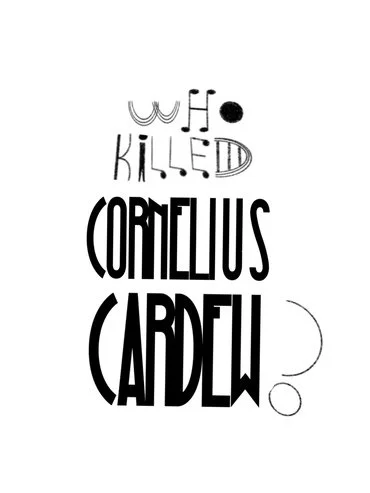Who Killed Cornelius Cardew?
On 13th December 1981 Cornelius Cardew, seen as the most important avant-garde British composer living at the time, was killed. Returning from a meeting of the Central Committee of the Revolutionary Communist Party – Marxist-Leninist, to which he belonged, he crossed the road from Leyton Underground station and was the victim of a hit-and-run. His involvement with anti-fascism, Irish solidarity, and advocacy of Marxist-Leninism, led to suggestions that his death was politically motivated rather than accidental. ‘Who Killed Cornelius Cardew?’ was the title of a performance at the Hastings Fringe by Amusia Productions. Amusia, who have previously covered the French composer Erik Satie, combined music, visuals, spoken word and audience participation. The musical and political importance of a life marked by dramatic breaks and frenzied energy was explored in front of a full and enthusiastic audience, where Cardew’s life story was presented through electroacoustic performances of his key work and accompanied by projections of his graphic scores.
Cardew, born in Winchcombe, Gloucestershire, was both a Marxist-Leninist and a musical revolutionary. Between 1953-57 he studied piano, cello, and composition at the Royal Academy of Music. Winning a scholarship to study electronic music, he went to Cologne to become assistant to Karl Heinz Stockhausen and was drawn to the minimalist and experimental music of artists like John Cage. Then, in one of the sudden breaks that marked his career, he denounced all of this as elitist and undemocratic. He wanted to make a music for and with the people. Indeed, later in his career he formed a Marxist rock band called People's Liberation Music, with an album entitled 'We only want the Earth'.
Cardew is best known for his use of graphic scores, a term that requires some explanation. The concept of graphic notation can feel somewhat alien and uncomfortable even to seasoned musicians. Rather than the composer providing the specific pitches and rhythms required through the medium of clefs, staves, quavers and time signatures, they instead provide instructions or suggestions through other visual means. This could be anything from a modified version of traditional notation, through to pictorial images, to abstract shapes. Cardew’s scores are iconic and quite beautiful, featuring geometric shapes and lines from which the performer creates their musical interpretation. The use of this type of score creates a necessity for collaboration between the composer and the musician; the music is in a process of being invented as it is performed, and there is little chance of it sounding the same way twice.
Cardew’s intention was the ‘socialisation’ of music. Reading a graphic score is not like reading traditional Western notation, where there is usually a single correct reading of a note or other feature. As such, the concept is useful in non-traditional music education and community music, allowing a shared music-making or composing experience with no need for training in music theory.
Increasingly radicalised during the 1960s, Cardew joined an anti-revisionist Marxist political party and devoted his life to militancy. His political involvement seems to have occurred because of the collapse of the Scratch Orchestra, the improvised group of musicians that he had put together in the 1960s as part of his efforts to produce a democratic and participatory musicianship. A Marxist faction amongst the musicians argued that this approach remained ‘bourgeois’, a crisis ensued, and the Scratch Orchestra broke up. Influenced by his friend and musical collaborator Michael Rowe, he embraced that beliefs and practices of the faction and joined what was then the Communist Party of England (Marxist-Leninist). This was an anti-revisionist party, one of a number internationally that argued that the Soviet Union had ceased to advocate revolution and had become revisionist. A product of the split between China and the Soviet Union, anti-revisionism initially embraced Maoism before settling for Enver Hoxha, the Albanian leader, for inspiration. In 1979 it became the Revolutionary Communist Party of Britain (Marxist-Leninist). It still exists today and has a bookshop in South London.
The performance showed how Cornelius Cardew’s music and his politics moved together. In the years before his death he addressed meetings, composed music in praise of Mao, Irish republicanism and workers’ struggles. When he died aged just 45 in 1981, it is worth remembering that the Hunger Strikes in the Maze Prison, which left ten Irish Republicans dead including the iconic Bobby Sands, had occurred just a few weeks before. No doubt if he had lived longer, he would have continued to practice intense political and musical commitment.
The musicians in Hastings offered a series of highly assured and artistic performances; graphic scores were used expressively and with sensitive sonic diversity. The projections accompanying the music provided the listener with a sense of context to the sounds they were hearing, creating an immersive and intimate experience as well as opportunities for audience participation ̶ in the spirit of both the compositions and their performance. Audience members were offered the chance to join in with the musicians using a selection of percussion instruments, as well as having a go at singing one of Cardew’s compositions as a group.
The musicologist in me would have liked the show to last for perhaps twice as long, with a full panel discussion of the musical choices made and analysis of the outcomes. After the performance ended it was moving to hear one of his former comrades who was in the audience, an ex-Ford Dagenham car worker, speak briefly about Cardew’s life and death. While his death remains a mystery, his comrade noted that the intelligence services routinely infiltrate left wing political organisations, and with Mrs Thatcher in power, the pressure on the left was high in 1981. However, it seems true to the essence of the music involved that the audience is left to interpret the experience for themselves.
Who Killed Cornelius Cardew? Performed by Amusia Production on the 8th of August 2019

